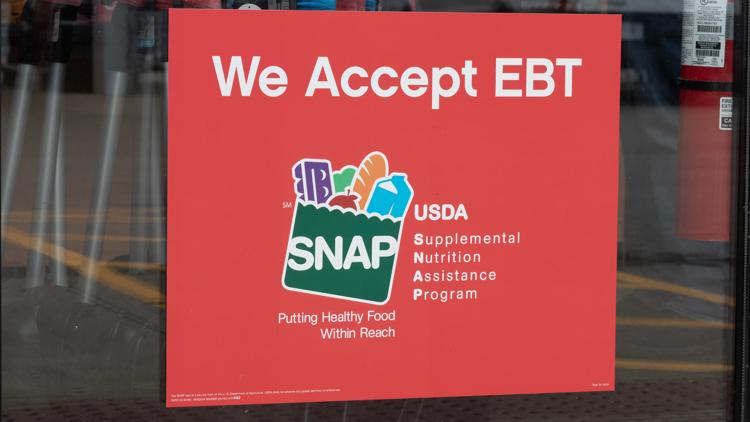
Millions of dollars in food aid were delayed for North Carolina residents over four years, as state health officials refused to implement fixes despite ongoing issues, according to aperformance audit released this week.
The audit by the Office of the State Auditor in North Carolina found approximately $83 millionSupplemental Nutrition Assistance Program benefits experienced delays from January 2021 to December 2024. Throughout this time, over 290,000 SNAP payments did not comply with federal time limits.
State Auditor Dave Boliek stated that the results highlight a concerning trend of inactivity from state officials.
"Although there were repeated instances of delays in the distribution of SNAP benefits, DHHS decided not to take corrective measures," Boliek stated in a release.
SNAP offers food support to families with limited income, senior citizens, and individuals with disabilities. In 2024, the initiative helped 1.4 million people in North Carolina, which is approximately one out of every eight residents. Over 66% of those who participated were households with children, as reported by federal statistics.
Federal legislation requires states to handle SNAP applications within 30 days, or within seven days for families facing urgent situations. The U.S. Department of Agriculture sets a requirement that at least 95% of applications adhere to these time limits.
Statewide performance fell short
North Carolina handled 3.7 million SNAP applications and provided around $15.7 billion in benefits throughout the audit period. In total, 98% of payments were made on time in 2021, but this percentage decreased to 91% between 2022 and 2024.
Although the state's overall performance was just slightly below the 95% federal benchmark, the audit revealed substantial differences between counties. Seven counties—Davidson, Edgecombe, Wake, Mecklenburg, Pitt, Cumberland, and Stanly—had between 14% and 25% of their benefit payments issued late.
Davidson County experienced the poorest results, with almost a quarter of its SNAP payments being delayed between 2022 and 2024. Mecklenburg County, which is the largest county in the state, had over 71,000 late payments, accounting for 21.2% of all its applications.
The audit revealed that the Division of Child and Family Well-Being does not monitor the extent of late payments, only whether they were submitted after the deadline. Officials were unable to ascertain if delayed benefits arrived just one day late or as much as 30 days late; auditors noted that this data could assist in directing resources to counties experiencing the most significant delays.
Food is a daily, non-postponable requirement," the audit noted. "The effects of delays become worse over time, particularly for people depending on these benefits to have meals.
State suspended enforcement actions
The Department of Health and Human Services has agreements with each of the 100 county social services offices, which detail performance expectations and allow the state to create improvement strategies and cut funding for counties that don't meet the required benchmarks.
Nevertheless, the DHHS leadership chose not to implement formal corrective actions regarding performance metrics from February 2020 to December 2024, as stated in the audit. The initial choice was driven by the effects of the COVID-19 pandemic on operations, and it remained in place due to persistent issues such as staff shortages and the expansion of Medicaid.
County social services offices were still required to adhere to the 95% timeliness benchmark during this time, yet there were no official repercussions for not meeting it.
In reply to the audit, DHHS representatives stated that they kept tracking county performance during the time frame and offered technical support. The agency mentioned that it intends to restart formal corrective measures in January 2025.
Several elements led to the postponements
The review found three main causes for delayed payments.
Initially, applications for SNAP increased starting in January 2022 after a temporary rule that allowed recipients to avoid recertification during the pandemic ended. Throughout the health crisis, most families kept getting benefits without going through the usual six-month recertification.
The number of applications reached its highest point in the summer of 2022, with an average of 75,000 new applications each month from June to August. This increase happened at the same time as the highest annual rise in food prices since 1979, which was 9.9% in 2022.
Second, government officials decided not to implement corrective measures against poorly performing counties even though they had the power to do so.
Third, local government offices experienced substantial workforce issues. Records from six of the lowest-performing counties indicated problems with hiring, keeping, and educating employees. Officials in Mecklenburg County mentioned that new SNAP staff typically take about nine months to reach full competence.
Agency disputes some recommendations
The audit suggested that the Division of Child and Family Well-Being regularly review county performance, implement corrective measures when standards are not fulfilled, and collect more data such as the financial figures and degree of payment delays.
In its official reply, DHHS agreed to establish regular monitoring and enforcement but contested the idea of tracking the monetary value of late payments. Division officials stated that examining these figures "would not significantly help in resolving the underlying reasons for delayed certifications" and would necessitate more financial resources.
State Auditor Boliek challenged that position.
It is concerning that DHHS leadership does not think monitoring delayed benefit amounts would enhance efficiency," he stated. "Assessing performance brings clarity and shows outcomes regarding the use of taxpayer funds.
In a different statement, Boliek's office mentioned that the promptness of the lowest-performing counties did not show improvement during the time when monitoring was ongoing without formal corrective measures. In certain instances, the performance of these counties declined further.
A March 2024 news article referenced in the audit highlighted the effects of delays on those receiving assistance, including an 80-year-old woman who had gone two days without food while awaiting her benefits.
Get the latest updates from WCNC Charlotte, including breaking news, weather, and traffic alerts that affect you, by downloading the WCNC Charlotte mobile app and turning on push notifications.